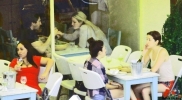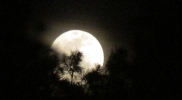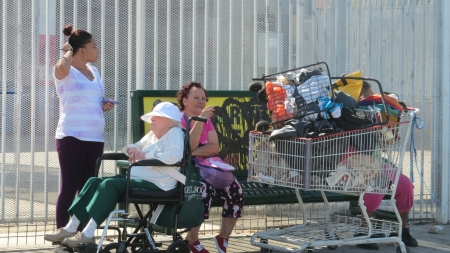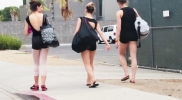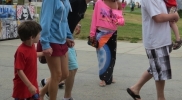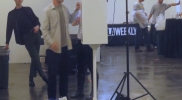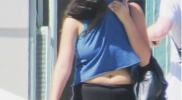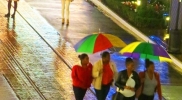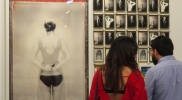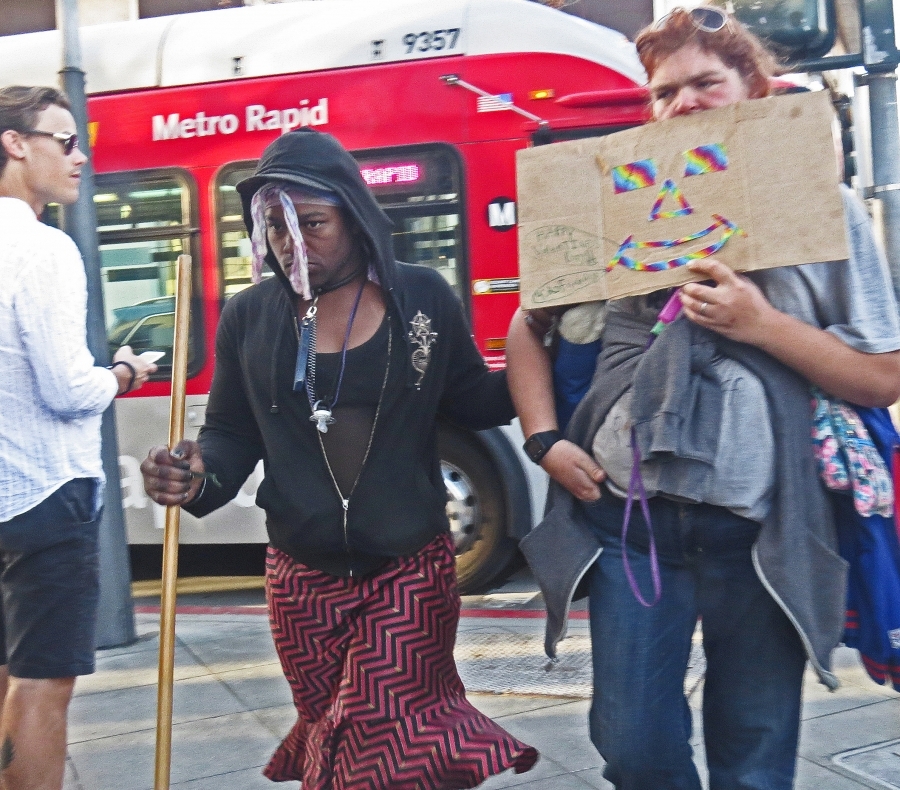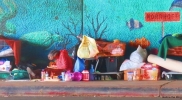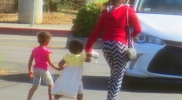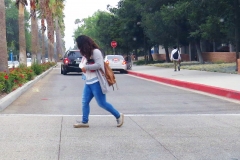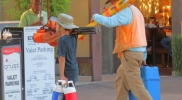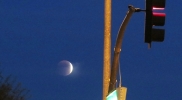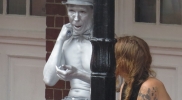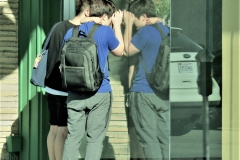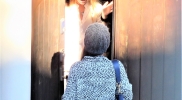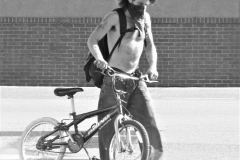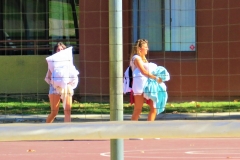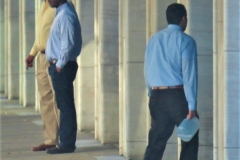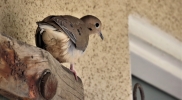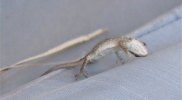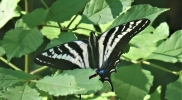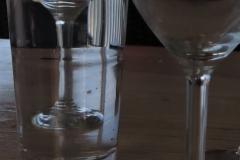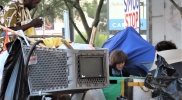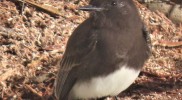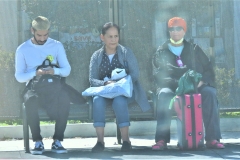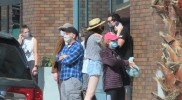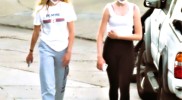|
|
Best Poems - Mourning
Best Poems – MOURNING/IN MEMORIAM
|
| |
| |
| |
Funeral Blues – W.F. Auden
“Stop all the clocks, cut off the telephone,
Prevent the dog from barking with a juicy bone,
Silence the pianos and with muffled drum
Bring out the coffin, let the mourners come.
Let aeroplanes circle moaning overhead
Scribbling on the sky the message He Is Dead,
Put crêpe bows round the white necks of the public doves,
Let the traffic policemen wear black cotton gloves.
He was my North, my South, my East and West,
My working week and my Sunday rest,
My noon, my midnight, my talk, my song;
I thought that love would last for ever: I was wrong.
The stars are not wanted now: put out every one;
Pack up the moon and dismantle the sun;
Pour away the ocean and sweep up the wood.
For nothing now can ever come to any good.” |
| |
Blues – Kamau Brathwaite “Wake up this mornin
sunshine int showin thru my door
wake up this mornin
sunshine int showin thru my door
cause the blues is got me
an i int got no strength to go no more
wake up this morning
clothes still scatter cross the floor
wake up this mornin
clothes still scatter cross the floor
loss night the ride was lovely
but she int comin back far more
sea island sunshine
whe are yu hidin now
sea island sunshine
whe are yu hden now
cd a sware a leff yu in the cupboard
but is only empties mockin at me in
there now
empty bottles knockin
laugh like a woman satisfye
empty bottles knockin
laugh like a woman satisfye
she full & leff me empty
laughin when i shd a crie
this place is empty bottles
this place is a woman satisfye
this place is empty bottles
this place is a woman satisfye
she drink muh sugar water
til mah sunshine die” |
| |
Ballad of the Despairing Husband – Robert Creeley “My wife and I lived all alone,
contention was our only bone,
I fought with her, she fought with me,
and things went on right merrily.
But now I live here by myself
with hardly a damn thing on the shelf,
and pass my days with little cheer
since I have parted from my dear.
Oh come home soon, I write to her.
Go fuck yourself, is her answer.
Now what is that, for Christian word?
I hope she feeds on dried goose turd.
But still I love her, yes I do.
I love her and the children too.
I only think it fit that she
should quickly come right back to me.
Ah no, she says, and she is tough,
and smacks me down with her rebuff.
Ah no, she says, I will not come
after the bloody things you’ve done.
Oh wife, oh wife—I tell you true,
I never loved no one but you.
I never will, it cannot be
another woman is for me.
That may be right, she will say then,
but as for me, there’s other men.
And I will tell you I propose
to catch them firmly by the nose.
And I will wear what dresses I choose!
And I will dance, and what’s to lose!
I’m free of you, you little prick,
and I’m the one to make it stick.
Was this the darling I did love?
Was this that mercy from above
did open violets in the spring—
and made my own worn self to sing?
She was. I know. And she is still,
and if I love her? then so I will.
And I will tell her, and tell her right . . .
Oh lovely lady, morning or evening or afternoon.
Oh lovely lady, eating with or without a spoon.
Oh most lovely lady, whether dressed or undressed or partly.
Oh most lovely lady, getting up or going to bed or sitting only.
Oh loveliest of ladies, than whom none is more fair, more gracious, more beautiful.
Oh loveliest of ladies, whether you are just or unjust, merciful, indifferent, or cruel.
Oh most loveliest of ladies, doing whatever, seeing whatever, being whatever.
Oh most loveliest of ladies, in rain, in shine, in any weather.
Oh lady, grant me time,
please, to finish my rhyme.” |
| |
A Song – Joseph Brodsky “I wish you were here, dear,
I wish you were here.
I wish you sat on the sofa
and I sat near.
The handkerchief could be yours,
the tear could be mine, chin-bound.
Though it could be, of course,
the other way around.
I wish you were here, dear,
I wish you were here.
I wish we were in my car
and you’d shift the gear.
We’d find ourselves elsewhere,
on an unknown shore.
Or else we’d repair
to where we’ve been before.
I wish you were here, dear,
I wish you were here.
I wish I knew no astronomy
when stars appear,
when the moon skims the water
that sighs and shifts in its slumber.
I wish it were still a quarter
to dial your number.
I wish you were here, dear,
in this hemisphere,
as I sit on the porch
sipping a beer.
It’s evening, the sun is setting;
boys shout and gulls are crying.
What’s the point of forgetting
if it’s followed by dying?” |
| |
Grief – Stephen Dobyns “Trying to remember you
is like carrying water
in my hands a long distance
across sand. Somewhere
people are waiting.
They have drunk nothing for days.
Your name was the food I lived on;
now my mouth is full of dirt and ash.
To say your name was to be surrounded
by feathers and silk; now, reaching out,
I touch glass and barbed wire.
Your name was the thread connecting my life;
now I am fragments on a tailor’s floor.
I was dancing when I
learned of your death; may
my feet be severed from my body.” |
| |
The Wake – Rita Dove “Your absence distributed itself
like an invitation.
Friends and relatives
kept coming, trying
to fill up the house.
But the rooms still gaped—
the green hanger swang empty, and
the head of the table
demanded a plate.
When I sat down in the armchair
your warm breath fell
over my shoulder.
When I climbed to bed I walked
through your blind departure.
The others stayed downstairs,
trying to cover
the silence with weeping.
When I lay down between the sheets
I lay down in the cool waters
of my own womb
and became the child
inside, innocuous
as a button, helplessly growing.
I slept because it was the only
thing I could do. I even dreamed.
I couldn’t stop myself.” |
Requiem – Abigail Gramig “Today
is the
perfect day
The sky
just so
clouds moving
fast
Drops of water
on leaves
of Russian sage
Dog sitting
her chin
on crossed paws
Light streams
through branches
of locust tree
I sit
just so
at the
small table
. . .
Everything is
perfect
just like this
you would have said” |
| |
Letter With No Address – Donald Hall “Your daffodils rose up
and collapsed in their yellow
bodies on the hillside
garden above the bricks
you laid out in sand, squatting
with pants pegged and face
masked like a beekeeper’s
against the black flies.
Buttercups circle the planks
of the old wellhead
this May while your silken
gardener’s body withers or moulds
in the Proctor graveyard.
I drive and talk to you crying
and come back to this house
to talk to your photographs.
There’s news to tell you:
Maggie Fisher’s pregnant.
I carried myself like an egg
at Abigail’s birthday party
a week after you died,
as three-year-olds bounced
uproarious on a mattress.
Joyce and I met for lunch
at the mall and strolled weepily
through Sears and B. Dalton.
Today it’s four weeks
since you lay on our painted bed
and I closed your eyes.
Yesterday I cut irises to set
in a pitcher on your grave;
today I brought a carafe
to fill it with fresh water.
I remember bone pain,
vomiting, and delirium. I remember
pond afternoons.
My routine
is established: coffee;
the Globe; breakfast;
writing you this letter
at my desk. When I go to bed
to sleep after baseball,
Gus follows me into the bedroom
as he used to follow us.
Most of the time he flops
down in the parlor
with his head on his paws.
Once a week I drive to Tilton
to see Dick and Nan.
Nan doesn’t understand much
but she knows you’re dead;
I feel her fretting. The tune
of Dick and me talking
seems to console her.
You know now
whether the soul survives death.
Or you don’t. When you were dying
you said you didn’t fear
punishment. We never dared
to speak of Paradise.
At five A.M., when I walk outside,
mist lies thick on hayfields.
By eight the air is clear,
cool, sunny with the pale yellow
light of mid-May. Kearsarge
rises huge and distinct,
each birch and balsam visible.
To the west the waters
of Eagle Pond waver
and flash through popples just
leafing out.
Always the weather,
writing its book of the world,
returns you to me.
Ordinary days were best,
when we worked over poems
in our separate rooms.
I remember watching you gaze
out the January window
into the garden of snow
and ice, your face rapt
as you imagined burgundy lilies.
Your presence in this house
is almost as enormous
and painful as your absence.
Driving home from Tilton,
I remember how you cherished
that vista with its center
the red door of a farmhouse
against green fields.
Are you past pity?
If you have consciousness now,
if something I can call
‘you’ has something
like ‘consciousness,’
I doubt you remember the lasts days.
I play them over and over:
I lift your wasted body
onto the commode, your arms
looped around my neck, aiming
your bony bottom so that
it will not bruise on a rail.
Faintly you repeat,
‘Momma, Momma.’
You lay
astonishing in the long box
while Alice Ling prayed
and sang ‘Amazing Grace’
a cappella. Three times today
I drove to your grave.
Sometimes, coming back home
to our circular driveway,
I imagine you’ve returned
before me, bags of groceries upright
in the back of the Saab,
its trunk lid delicately raised
as if proposing an encounter,
dog-fashion, with the Honda.” |
| |
| Elegy – Miguel Hernández (trans. by Timothy Baland) Like lightning death struck my close friend Ramón Sijé in our home town of Orihuela.
“Ramón, right now I want to be
the mournful friend who tends the ground
you fertilize and lie in, gave too soon. Since this useless grief of mine
likes the taste of rain, snail shells, the organs of the body,
I’ll go ahead and feed your heart
to the disheartened poppies.
Grief bunches up between my ribs,
each breath I take is painful.
The hard slap of a hand, an icy fist,
that violent, that fatal, unseen
blow of an ax has cut you down.
There’s nothing big enough to stick my hurt in.
I cry anguished tears,
I feel your death more than my life.
I walk across the stubble of the dead:
no warmth, no consolation from a single body.
I leave this heart of mine behind and try to go on living.
Death flew away with you too early,
that morning came before it should have,
before your time you are in the ground.
Lovesick death will get no forgiveness out of me,
none for this thankless life,
none for the earth, nor for the black nothing.
In these hands of mine a storm made of rocks
is brewing, lightning, vicious axes
dry and starving for catastrophes.
I want to dig up the earth with my teeth,
I want to take dry, fiery bites
pulling it apart bit by bit.
I want to tear up the earth until I find you,
so I can kiss your noble skull,
unbandage your mouth, and bring you back to life.
You will come back to the fig tree in my backyard:
your soul will be at peace there,
high up among the blossoms, gathering
the wax and honey of angelic hives.
You’ll come back to words whispered through
grillwork windows by romantic field hands.
You’ll blow away the shadows on my brow,
and your woman and the bees will take
turns claiming your blood as theirs.
Your heart, now only crumpled velvet,
calls from a field of surf-like almond trees
to my voice, wanting and full of love.
And I call you to come to the milky
almond blossoms who are souls flying.
I miss you, Ramón. Ramón, we still have
so many things to talk about.”
January 10, 1936
|
| |
[Everything Is Full Of You] – Miguel Hernández (trans. by Ted Genoways) “Everything is full of you
and I am full of everything:
the cities are full,
and the cemeteries are full,
you, with all the houses,
me, with all the bodies.
Down the streets, I will leave
something that I will retake:
pieces of my life
come from far away.
I go, feathered by agony
against my will, to see myself
in the threshold, in the bottom
hidden since birth.
Everything is full of me:
of something that is yours and memory
lost, but found
once more, some day.
Days that linger behind
decidedly black,
indelibly red,
golden upon your body.
Cast from your hair,
everything is full of you:
of something that I haven’t found
and look for among your bones.” |
What The Living do – Marie Howe “Johnny, the kitchen sink has been clogged for days, some utensil probably
fell down there.
And the Drano won’t work but smells dangerous, and the crusty dishes
have piled up
waiting for the plumber I still haven’t called. This is the everyday we
spoke of.
It’s winter again: the sky’s a deep headstrong blue, and the sunlight
pours through
the open living room windows because the heat’s on too high in here, and
I can’t turn it off.
for weeks now, driving, or dropping a bag of groceries in the street,
the bag breaking,
I’ve been thinking: This is what the living do. And yesterday, hurrying
along those
wobbly bricks in the Cambridge sidewalk, spilling my coffee down my
wrist and sleeve,
I thought it again, and again, later, when buying a hairbrush: This is it.
Parking. Slamming the car door shut in the cold. What you called
that yearning.
What you finally gave up. We want the spring to come and the winter to
pass. We want
whoever to call or not call, a letter, a kiss—we want more and more and
then more of it.
But there are moments, walking, when I catch a glimpse of myself in the
window glass,
say, the window of the corner video store, and I’m gripped by a cherishing
so deep
for my own blowing hair, chapped face, and unbuttoned coat that I’m
speechless:
I am living, I remember you.” |
The Glory of the Day Was In Her Face – James Weldon Johnson “The glory of the day was in her face,
The beauty of the night was in her eyes.
And over all her loveliness, the grace
Of Morning blushing in the early skies.
And in her voice, the calling of the dove;
Like music of a sweet, melodious part.
And in her smile, the breaking light of love;
And all the gentle virtues in her heart.
And now the glorious day, the beauteous night,
The birds that signal to their mates at dawn,
To my dull ears, to my tear-blinded sight
Are one with all the dead, since she is gone.” |
| |
Apology to Andrew – Richard Jones “Last night, I heard your mother,
my sister, crying in her sleep.
She was sleeping with my mother,
who is deaf, and did not wake
to comfort her. Mother and daughter
sleeping in one bed,
trying to make the world whole again.
My mother was there
to make losing you less
painful. But it is
painful. All day
they both had cried,
praying for strength.
I remember saying,
as though it would help,
as though it were true,
there is nothing we can do
to bring him back.
Now strength and rest will come
from what we suffer.
I even made a little metaphor,
stolen from the Bible:
the sun will rise from the darkness.
But last night, dreaming of you
lost in the river, your mother
kept crying,
your grandmother kept sleeping,
and I kept lying
there in the dark
as if I were you,
the dead child,
unable or unwilling to hear.
Andrew, I am sorry:
I always believed in words,
and sent them instead of my body
to comfort the ones I love,
your mother and grandmother,
my sister and mother,
and Andrew, I did not rise
to put my arms around them.” |
| How It Is – Maxine Kumin
“Shall I say how it is in your clothes?
A month after your death I wear your blue jacket.
The dog at the center of my life recognizes
you’ve come to visit, he’s ecstatic.
In the left pocket, a hole.
In the right, a parking ticket
delivered up last August on Bay State Road.
In my heart, a scatter like milkweed,
a flinging from the pods of the soul.
My skin presses your old outline.
It is hot and dry inside.
I think of the last day of your life,
old friend, how I would unwind it, paste
it together in a different collage,
back from the death car idling in the garage,
back up the stairs, your praying hands unlaced,
reassembling the bits of bread and tuna fish
into a ceremony of sandwich,
running the home movie backward to a space
we could be easy in, a kitchen place
with vodka and ice, our words like living meat.
Dear friend, you have excited crowds
with your example. They swell
like wine bags, straining at your seams.
I will be years gathering up our words,
fishing out letters, snapshots, stains,
leaning my ribs against this durable cloth
to put on the dumb blue blazer of your death.”
|
The Old Familiar Faces – Charles Lamb “I have had playmates, I have had companions,
In my days of childhood, in my joyful school-days;
All, all are gone, the old familiar faces.
I have been laughing, I have been carousing,
Drinking late, sitting late, with my bosom cronies;
All, all are gone, the old familiar faces.
I loved a Love once, fairest among women:
Closed are her doors on me, I must not see her—
All, all are gone, the old familiar faces.
I have a friend, a kinder friend has no man:
Like an ingrate, I left my friend abruptly;
Left him, to muse on the old familiar faces.
Ghost-like I paced round the haunts of my childhood,
Earth seem’d a desert I was bound to traverse,
Seeking to find the old familiar faces.
Friend of my bosom, thou more than a brother,
Why were not thou born in my father’s dwelling?
So might we talk of the old familiar faces.
How some they have died, and some they have left me,
And some are taken from me; all are departed;
All, all are gone, the old familiar faces.” |
| |
| The Mower – Philip Larkin
“The mower stalled, twice; kneeling, I found
A hedgehog jammed up against the blades,
Killed. It had been in the long grass.
I had seen it before, and even fed it, once.
Now I had mauled its unobtrusive world
Unmendably. Burial was no help:
Next morning I got up and it did not.
The first day after a death, the new absence
Is always the same; we should be careful
Of each other, we should be kind
While there is still time.”
|
12/19/02 – David Lehman “It seemed nothing would ever be the same
This feeling lasted for months
Not a day passed without a dozen mentions
of the devastation and the grief
Then life came back
it returned like sap to the tree
shooting new life into the veins
of parched leaves turning them green
and the old irritations came back,
they were life, too,
crowds pushing, taxis honking, the envies, the anger,
the woman who could not escape her misery
as she stood between two mirrored walls
couldn’t sleep, took a pill, heard the noises of neighbors
the dogs barking, the pigeons in the alley yipping weirdly
and the phone that rang at eight twenty with the news
of Lucy’s overdose we just saw her last Friday evening
at Jay’s on Jane Street she’d been dead for a day or so
wen they found her and there was no note
the autopsy’s today the wake day after tomorrow
and then I knew that life has resumed, ordinary bitching life
had come back” |
| |
Walk Slowly – Adelaide Love “If you should go before me, dear, walk slowly
Down the ways of death, well-worn and wide,
For I would want to overtake you quickly
And seek the journey’s ending by your side.
I would be so forlorn not to descry you
Down some shining highroad when I came;
Walk slowly, dear, and often look behind you
And pause to hear if someone calls your name.” |
| |
Silence Alone – Adelaide Love “There is no utterance for love or death;
Words cannot speak for grief or ecstasy;
They must stand by like impotent pale ghosts
When hearts are blest or stricken verily…” |
| |
| Patterns – Amy Lowell
“I walk down the garden-paths,
And all the daffodils
Are blowing, and the bright blue squills.
I walk down the patterned garden-paths
In my stiff, brocaded gown.
With my powdered hair and jewelled fan,
I too am a rare
Pattern. As I wander down
The garden-paths.
My dress is richly figured,
And the train
Makes a pink and silver stain
On the gravel, and the thrift
Of the borders.
Just a plate of current fashion,
Tripping by in high-heeled, ribboned shoes.
Not a softness anywhere about me,
Only whale-bone and brocade.
And I sink on a seat in the shade
Of a lime-tree. For my passion
Wars against the stiff brocade.
The daffodils and squills
Flutter in the breeze
As they please.
And I weep;
For the lime tree is in blossom
And one small flower has dropped upon my bosom.
And the splashing of waterdrops
In the marble fountain
Comes down the garden-paths.
The dripping never stops.
Underneath my stiffened gown
Is the softness of a woman bathing in a marble basin,
A basin in the midst of hedges grown
So thick, she cannot see her lover hiding,
But she guesses he is near,
And the sliding of the water
Seems the stroking of a dear
Hand upon her.
What is Summer in a fine brocaded gown!
I should like to see it lying in a heap upon the ground.
All the pink and silver crumpled up on the ground.
I would be the pink and silver as I ran along the paths,
And he would stumble after,
Bewildered by my laughter.
I should see the sun flashing from his sword-hilt and the buckles on his shoes.
I would choose
To lead him in a maze along the patterned paths,
A bright and laughing maze for my heavy-booted lover,
Till he caught me in the shade,
And the buttons of his waistcoat bruised my body as he clasped me,
Aching, melting, unafraid.
With the shadows of the leaves and the sundrops,
And the plopping of the waterdrops,
All about us in the open afternoon—
I am very like to swoon
With the weight of this brocade,
For the sun sifts through the shade.
Underneath the fallen blossom
In my bosom,
Is a letter I have hid.
It was brought to me this morning by a rider from the Duke.
‘Madam, we regret to inform you that Lord Hartwell
Died in action Thursday sen’night.’
As I read it in the white, morning sunlight,
The letters squirmed like snakes.
‘Any answer, Madam,’ said my footman.
‘No,’ l told him.
‘See that the messenger takes some refreshment.’
‘No, no answer.’
And I walked into the garden,
Up and down the patterned paths,
In my stiff, correct brocade.
The blue and yellow flowers stood up proudly in the sun,
Each one.
I stood upright too,
Held rigid to the pattern
By the stiffness of my gown.
Up and down I walked,
Up and down.
In a month he would have been my husband.
In a month, here, underneath this lime,
We would have broke the pattern;
He for me, and I for him,
He as Colonel, I as Lady,
On this shady seat.
He had a whim
That sunlight carried blessing.
And I answered, ‘It shall be as you have said.’
Now he is dead.
In Summer and in Winter I shall walk
Up and down
The patterned garden-paths
In my stiff, brocaded gown.
The squills and daffodils
Will give place to pillared roses, and to asters, and to snow.
I shall go
Up and down,
In my gown.
Gorgeously arrayed,
Boned and stayed.
And the softness of my body will be guarded from embrace
By each button, hook, and lace.
For the man who should loose me is dead,
Fighting with the Duke in Flanders,
In a pattern called a war.
Christ! What are patterns for?”
|
| |
Birthday Poem – Erin Murphy “It’s 2 a.m. and I can’t remember
the last name of my friend Joy
who died of breast cancer.
I can see her wig, slightly matted,
with the curls she always wanted,
see her holding hands with her daughter
that afternoon we walked to Long Point.
But the name…a W, I think…damn it…
Joy, who kicked her drinking husband out
the last month, who interviewed
the local politician (no sir, tell me
what you think, not what you think
everyone wants you to think),
who drew a thousand yellow smiley faces
and called it Portraits of Prozac.
Walton? Williams? Winston?
I brought her copies of Vanity Fair and People,
heated a few cans of tomato soup
in her grease-splattered kitchen.
I never took an SOS pad to that back-splash
or made a homemade stew, never
drove her, like her good neighbor did,
to the Grand Canyon, i.v. trolley in tow.
I just sat with her every few weeks
in that dark bedroom that smelled
of her daughter’s new kittens,
picked up her spilled blue pills
from the carpet under her bed and ticked them
one by one into the bottle,
reaching for them the way I’m combing my mind
now for her name: Wilson? Wiggins?
The tattered paisley address book
is gone so I can’t look her up
and anyone who knew her is asleep now
so I can’t call—and besides,
my stepdaughter is downstairs talking
to a boyfriend an ocean away,
which is how far I feel from late-night
hushed giggles and a phone cord
stretched to the front stoop,
that is how old I am now, old enough
to have forgotten the name of a friend
who died, died for God’s sake,
not a friend who gave me a ride
to Syracuse one weekend or loaned me
a gown for a college ball.
Her daughter lives with the ex now.
He’s remarried and sober, I’m told.
Once when my husband and son
ran out of gas on Route 213,
the new wife picked them up in her red Saab
and took them to the Texaco in Galena.
She seems nice, they said. Dyes her hair.
Gwinner. Joy Gwinner. And her daughter’s name
is Hope.” |
| |
Love Sonnet 94 – Pablo Neruda (trans. by Alistair Reid)
“If I die, survive me with such sheer force
that you waken the furies of the pallid and the cold,
From south to south lift your indelible eyes,
From sun to sun dream through your singing mouth.
I don’t want your laughter or your steps to waver,
I don’t want my heritage of joy to die.
Don’t call up my person. I am absent.
Live in my absence as if in a house.
Absence is a house so vast
that inside you will pass through its walls
and hang pictures on the air.
Absence is a house so transparent
that I, lifeless, will see you living,
and if you suffer, my love, I will die again.” |
I Needed To Talk To My Sister – Grace Paley “I needed to talk to my sister
talk to her on the telephone I mean
just as I used to every morning
in the evening too whenever the
grandchildren said a sentence that
clasped both our hearts
I called her phone rang four times
you can imagine my breath stopped then
there was a terrible telephonic noise
a voice said this number is no
longer in use how wonderful I
thought I can
call again they have not yet assigned
her number to another person despite
two years of absence due to death” |
| |
Lydia Is Gone This Many A Year – Lizette Woodworth Reese “Lydia is gone this many a year,
Yet when the lilacs stir,
In the old gardens far or near,
The house is full of her.
They climb the twisted chamber stair;
Her picture haunts the room;
On the carved shelf beneath it there,
They heap the purple bloom.
A ghost so long has Lydia been,
Her cloak upon the wall,
Broidered, and gilt, and faded green,
Seems not her cloak at all.
The book, the box on mantel laid,
The shells in a pale row,
Are those of some dim little maid,
A thousand years ago.
And yet the house is full of her;
She goes and comes again;
And longings thrill, and memories stir,
Like lilacs in the rain.
Out in their yards the neighbors walk,
Among the blossoms tall;
Of Anne, of Phyllis, do they talk,
Of Lydia not at all.” |
| |
A Peal Of Bells – Christina Rossetti “Strike the bells wantonly,
Tinkle tinkle well;
Bring me wine, bring me flowers,
Ring the silver bell.
All my lamps burn scented oil,
Hung on laden orange-trees,
Whose shadowed foliage is the foil
To golden lamps and oranges.
Heap my golden plates with fruit,
Golden fruit, fresh-plucked and ripe;
Strike the bells and breathe the pipe;
Shut out showers from summer hours—
Silence that complaining lute—
Shut out thinking, shut out pain,
From hours that cannot come again.
Strike the bells solemnly,
Ding dong deep:
My friend is passing to his bed,
Fast asleep;
There’s plaited linen round his head,
While foremost go his feet—
His feet that cannot carry him.
My feast’s a show, my lights are dim;
Be still, your music is not sweet,—
There is no music more for him:
His lights are out, his feast is done;
His bowl that sparkled to the brim
Is drained, is broken, cannot hold;
My blood is chill, his blood is cold;
His death is full, and mine begun.” |
| |
Farewell – Christina Rossetti “When I am dead, my dearest,
Sing no sad songs for me:
Plant thou no roses at my head,
Nor shady cypress tree:
Be the green grass above me
With showers and dewdrops wet:
And if thou wilt, remember,
And if thou wilt, forget.
I shall not see the shadows,
I shall not feel the rain;
I shall not hear the nightingale
Sing on as if in pain:
And dreaming through the twilight
That doth not rise nor set,
Haply I may remember,
And haply may forget.” |
| |
My Friend – Christina Rossetti “Two days ago with dancing glancing hair,
With living lips and eyes:
Now pale, dumb, blind, she lies;
So pale, yet still so fair.
We have not left her yet, not yet alone;
But soon must leave her where
She will not miss our care,
Bone of our bone.
Weep not; O friends, we should not weep:
Our friend of friends lies full of rest;
No sorrow rankles in her breast,
Fallen fast asleep.
She sleeps below,
She wakes and laughs above:
To-day, as she walked, let us walk in love;
To-morrow follow so.”
|
| |
Remember – Christina Rossetti “Remember me when I am gone away,
Gone far away into the silent land;
When you can no more hold me by the hand,
Nor I half turn to go yet turning stay.
Remember me when no more day by day
You tell me of our future that you planned:
Only remember me; you understand
It will be late to counsel then or pray.
Yet if you should forget me for awhile
And afterwards remember, do not grieve:
For if the darkness and corruption leave
A vestige of the thoughts that once I had,
Better by far you should forget and smile
Than that you should remember and be sad.” |
| |
Another Weeping Woman – Wallace Stevens “Pour the unhappiness out
From your too bitter heart,
Which grieving will not sweeten.
Poison grows in this dark.
It is in the water of tears
Its black blooms rise.
The magnificent cause of being,
The imagination, the one reality
In this imagined world
Leaves you
With him for whom no phantasy moves,
And you are pierced by a death.” |
| |
| Elegy For My Father – Mark Strand Robert Strand 1908-1968
“1 THE EMPTY BODY
The hands were yours, the arms were yours,
But you were not there.
The eyes were yours, but they were closed and would not open.
The distant sun was there.
The moon poised on the hill’s white shoulder was there.
The wind on Bedford Basin was there.
The pale green light of winter was there.
Your mouth was there,
But you were not there.
When somebody spoke, there was no answer.
Clouds came down
And buried the buildings along the water,
And the water was silent.
The gulls stared.
The years, the hours, that would not find you
Turned in the wrists of others.
There was no pain. It had gone.
There were no secrets. There was nothing to say.
The shade scattered its ashes.
The body was yours, but you were not there.
The air shivered against its skin.
The dark leaned into its eyes.
But you were not there…” |
| |
Graveyard Blues – Natasha Trethewey “It rained the whole time we were laying her down;
Rained from church to grave when we put her down.
The suck of mud at our feet was a hollow sound.
When the preacher called out I held up my hand;
When he called for a witness I raised my hand—
Death stops the body’s work, the soul’s a journeyman.
The sun came out when I turned to walk away,
Glared down on me as I turned and walked away—
My back to my mother, leaving her where she lay.
The road going home was pocked with holes,
That home-going road’s always full of holes;
Though we slow down, time’s wheel still rolls.
I wander now among names of the dead:
My mother’s name, stone pillow for my head.” |
| |
| The Stream – Mona Van Duyn For My Mother
“Four days with you, my father three months dead.
You can’t tell months from years, but you feel sad,
and you hate the nursing home. I’ve arranged a lunch
for the two of us, and somehow you manage to pinch
the pin from Madrid I bought you closed at the neck
of your best red blouse, put on new slacks, and take
off your crocheted slippers to put on shiny shoes,
all by yourself. ‘I don’t see how you could close
that pin. You look so nice!’ ‘Well, I tried and tried,
and worked till I got it. They didn’t come,’ you said.
‘Mother, I’m sorry, this is the wrong day,
our lunch is tomorrow. Here’s a big kiss anyway
for dressing up for me. The nurse will come in
tomorrow and help you put on your clothes and pin.’
‘These last few days her mind has certainly cleared.
Of course the memory’s gone,’ your doctor said.
Next day they bathed you, fixed your hair and dressed
you up again, got a wheelchair and wheeled you past
the fat happy babbler of nonsense who rolled her chair
all day in the hall, the silent stroller who wore
a farmer’s cap and bib overalls with rows
of safety pins on the bib, rooms of old babies
in cribs, past the dining hall, on down to a sunny
lounge in the other wing. ‘Where can I pee,
if I have to pee? I don’t like it here, I’m afraid.
Where’s my room? I’m going to faint,’ you said.
But they came with the lunch and card table and chairs
and bustled and soothed you and you forgot the fears
and began to eat. The white tablecloth, the separate
plate for salad, the silvery little coffee pot,
the covers for dishes must have made you feel
you were in a restaurant again after all
those shut-in years. (Dad would never spend the money,
but long ago you loved to eat out with me.)
You cleaned your soup bowl and dishes, one by one,
and kept saying, ‘This is fun! This is fun!’
The cake fell from your trembly fork, so I fed
it to you. ‘Do you want mine, too?’ ‘Yes,’ you said,
‘and I’ll drink your milk if you don’t want it.’ (You’d
lost twelve pounds already by refusing your food.)
I wheeled you back. ‘Well, I never did that before!
Thank you, Jane.’ ‘We’ll do it again.’ ‘Way down there,’
you marveled. You thanked me twice more. My eyes were wet.
‘You’re welcome, Mother. You’ll have a good nap now, I’ll bet.’
I arranged for your old companion, who came twice a day,
to bring you milkshakes, and reached the end of my stay.
On the last night I helped you undress. Flat dugs
like antimacassars lay on your chest, your legs
and arms beetle-thin swung from the swollen belly
(the body no more misshapen, no stranger to see,
after all, at the end than at the beloved beginning).
You chose your flowered nightgown as most becoming.
You stood at the dresser, put your teeth away,
washed your face, smoothed on Oil of Olay,
then Avon night cream, then put Vicks in your nose,
then lay on the bed. I sat beside your knees
to say goodbye for a month. ‘You know I’ll call
every Sunday and write a lot. Try to eat well—’
Tears stopped my voice. With a girl’s grace you sat up
and, as if you’d done it lifelong, reached out to cup
my face in both your hands, and, as easily
as if you’d said it lifelong, you said, ‘Don’t cry,
don’t cry. You’ll never know how much I love you.’
I kissed you and left, crying. It felt true.
I forgot to tell them that you always sneaked your meat,
you’d bragged, to the man who ate beside you. One night
at home, my heart ringing with what you’d said,
then morning, when the phone rang to say you were dead.
I see your loving look wherever I go.
What is love? Truly, I do not know.
Sometimes, perhaps, instead of a great sea,
it is a narrow stream running urgently
far below ground, held down by rocky layers,
the deeds of mother and father, helpless soothsayers
of how our life is to be, weighted by clay,
the dense pressure of thwarted needs, the replay
of old misreadings, by hundreds of feet of soil,
the gifts and wounds of the genes, the short or tall
shape of our possibilities, seeking
and seeking a way to the top, while above, running
and stumbling this way and that on the clueless ground,
another seeker clutches a dowsing-wand,
which bends, then lifts, dips, then straightens, everywhere,
saying to the dowser, it is there, it is not there,
and the untaught dowser believes, does not believe,
and finally simply stands on the ground above,
till a sliver of stream finds a crack and makes its way,
slowly, too slowly, through rock and earth and clay.
Here at my feet I see, after sixty years,
the welling water-to which I add these tears.” |
| |
Complaint – James Wright
“She’s gone. She was my love, my moon or more.
She chased the chickens out and swept the floor,
Emptied the bones and nut-shells after feasts,
And smacked the kids for leaping up like beasts.
Now morbid boys have grown past awkwardness;
The girls let stitches out, dress after dress,
To free some swinging body’s riding space
And form the new child’s unimagined face.
Yet, while vague nephews, spitting on their curls,
Amble to pester winds and blowsy girls,
What arm will sweep the room, what hand will hold
New snow against the milk to keep it cold?
And who will dump the garbage, feed the hogs,
And pitch the chickens’ heads to hungry dogs?
Childbirth and midnight sassafras and rain.
New snow against her face and hands she bore,
And now lies down, who was my moon or more.” |

Comments are closed.
|
|
